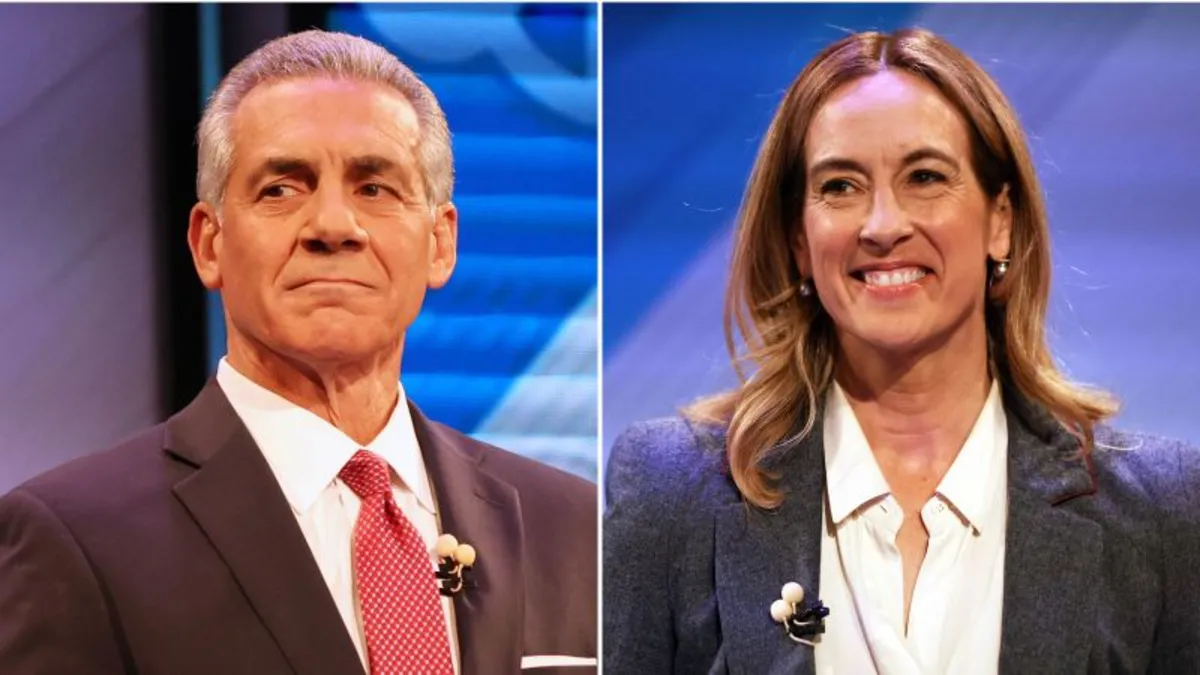
The sharp divides between New Jersey's candidates for governor were vividly highlighted during Wednesday night’s second debate. The candidates offered contrasting evaluations of former President Donald Trump, with Republican nominee Jack Ciattarelli awarding Trump an A grade, while Democratic nominee U.S. Representative Mikie Sherrill gave him an F. This debate was marked by a more contentious atmosphere compared to their first encounter, focusing heavily on Trump, personal controversies, and the pressing local issue of affordability. With the November 4 election looming, the debate set the stage for a heated final month of campaigning.
Throughout the evening, Ciattarelli took multiple opportunities to praise the policies of the Trump administration. He highlighted the tax reforms introduced in the "One Big Beautiful Bill Act" and expressed his support for Trump’s immigration crackdown, arguing that having a governor who aligns with the President would benefit New Jersey. Ciattarelli noted that Trump improved his margin of defeat in New Jersey by 10 points from the 2020 to the 2024 presidential elections, losing by just 6 points last year.
When asked about his affiliation with Trump’s “Make America Great Again movement,” Ciattarelli attempted to distance himself, stating, “I’m part of a New Jersey movement. We need change in New Jersey. We’ve got various crises that are raging across this state that are punishing the middle class.” In contrast, Sherrill accused him of being “100% MAGA” and claimed he had shown “zero signs of standing up to this president.” She pointed to rising costs impacting New Jersey residents, attributing them to Trump’s aggressive tariffs.
Sherrill, who frequently references her military service during her campaign, defended her service record amid controversy over the National Archives' inadvertent release of her unredacted military record, which included her Social Security number. Addressing the matter, she explained her absence from her graduation ceremony in the 1990s, stating, “Look, I didn’t turn in some of my classmates, so I didn’t walk at graduation,” referring to a cheating scandal at the Naval Academy.
Sherrill linked the records release to what she described as abuses of power by the Trump administration and criticized Ciattarelli's campaign for its role in the incident. Ciattarelli countered by blaming the National Archives for the mishap and demanded further transparency from Sherrill regarding the circumstances surrounding her graduation. “I think the people in New Jersey deserve an answer as to why she was punished at the Naval Academy,” he argued.
During a discussion on job creation, Sherrill launched a personal attack on Ciattarelli, referencing a past report that revealed a medical publishing company he owned received millions in grants from the pharmaceutical industry. She accused him of promoting propaganda that downplayed the risks of opioid abuse. “Shame on you,” Ciattarelli replied, redirecting the blame to Democratic border policies under President Biden for the rise of fentanyl in the U.S. The exchange grew increasingly heated, with both candidates trading barbs over their professional careers and the impact of their actions on New Jersey residents.
Ciattarelli accused Sherrill of hypocrisy regarding the ongoing government shutdown, pointing out her votes to keep the government open during previous shutdowns under Biden, while opposing similar resolutions during Trump’s presidency. Sherrill defended her stance, arguing that the congressional Democrats are fighting for health care funding and subsidies to support millions of people affected by cuts earlier this year.
As the candidates tackled the pressing issue of surging electricity bills, they presented contrasting strategies. Sherrill proposed declaring a state of emergency regarding utility costs and emphasized her plan to expand renewable energy sources, including solar and nuclear power. In contrast, Ciattarelli criticized overinvestment in renewable projects and advocated for a mixed energy approach that includes fossil fuels, solar, and nuclear energy.
The debate concluded with a light-hearted discussion about New Jersey's unique law that prohibits customers from pumping their own gas. In a rare moment of agreement, both candidates acknowledged the state’s quirky regulation. Sherrill recounted her experiences driving into New Jersey and Ciattarelli affirmed, “We don’t have to pump our own gas. Jersey girls don’t like to pump their own gas. We’ll continue to have full service.” This moment provided a brief respite from the tense exchanges throughout the debate, reminding viewers of the distinctive character of New Jersey.